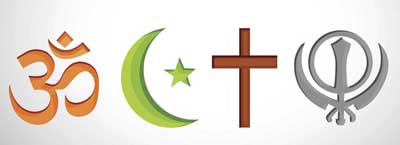Among all the common perceptions, the perception that ‘life is most valuable’ is the most common perception. And, the axiomaticity (reasoning) behind this perception is the simple understanding that life is the prerequisite to value anything else (in life). But, is this ultimate truth that there is really nothing more valuable than life? Or, reality is something else which is veiled by this common perception? For instance, if life were most valuable then how do we explain wars, where lives are laid to establish the value of something else? Do we have some other values for which even life may be put at stake? What about values such as Mukti (freedom/independence/authenticity/dignified living…liberation) In reality one’s values are the purest possessions which define the ones who possess/uphold them. Purest possession needs a worthy vessel to uphold it. And, there haven’t been anything purer and more valuable than the eternal spiritual values.
The ones who are Jeevan-Mukt(liberated/transcendentals/worthy) they alone see the real order of values which adorn the consciousness of human beings. Dignified living, freedom, independence, liberation etc may be named as some of the many values which are more valuable in the eye of Indic wisdom than compulsive life.
Indic wisdom has never wavered from upholding the eternal flame of spiritual values. Bhagavan Ram’s life journey is Maryadaa (epitome/pinnacle/acme/ultimate limit…) of upholding the eternal spiritual values. And, it is in the aforesaid spirit that Ram-Rajya continues to reign spiritually in the heart and mind of every one who considers oneself as the part (Ansh) of the eternal consciousness
Vivek (clear discernment) sees the eternal values at par with supreme truth because Sanaatan alone can be termed as the supreme truth. And, when the ‘thing’ to be upheld is supreme truth then, the persons who stay equanimous in their mind, word and deed irrespective of the circumstances, they alone may be termed as worthy ones? It is with such Sahaj vyavhaar (value based civic behaviour) alone that the satva (real meaning and purport) of motto ‘Satyamev Jayate’ may be established as living reality/truth across the globe. Take an example, it is our envisioning the world with an equanimous eye that has kept Bharat away from ever playing as an aggressor to other countries. Such has been our vision from the time immemorial. We hear many tales from our Itihaas (ancestral life stories) that dharmic kings never encroached upon others’ territories. For instance, all of us know from Ramayana that after Bali got killed, Bhagavan Ram anointed Sugriv as King of kishkindha and after Raavan got killed Lanka’s throne was given to Vibhishana. Bhagavan Ram could have easily annexed their kingdoms to Ayodhya if he were lacking equanimity.
Looking at the histories of various other religions of the world, we find them of later origin on the scale of time therefore, logically these should have been much more evolved and advanced in upholding the spiritual values yet, contrary to the rationality and spiritual evolution, enslavement and torture of people in the name of Jihad or crusade is written all over the pages of their history? Why is it so? Please ponder. Bhagavan Ram didn’t occupy Lanka and Kishkindha because, the eternal spiritual values (Sanaatan Dharma) don’t allow/envisage that. Imagine, had Bhagavan Ram extended suzerainty of Ayodhya(Ram-Rajya) to the defeated territories, would Bhagavan Ram’s Rajya have still qualified to be known as Ram-Rajya ?
Indic wisdom has never wavered from upholding the eternal flame of spiritual values. Bhagavan Ram’s life journey is Maryadaa (epitome/pinnacle/acme/ultimate limit…) of upholding the eternal spiritual values. And, it is in the aforesaid spirit that Ram-Rajya continues to reign spiritually in the heart and mind of every one who considers oneself as the part (Ansh) of the eternal consciousness. Indic culture is based on the spiritual principle of Sanaatanatva which essentially means that our existence is beginningless and endless, consult any popular dictionary and you will find that the word Eternal or Eternity doesn’t convey the purport of the word Sanatan or Sanaatanatva fully. Shouldn’t we ponder over it, why there is no proper word in the English language for it?
When translated in cultural/living terms, Sanaatanatva translates to mean Vasudhaiva Kutumbakam considering all the inhabitants of the earth as family-members. But how can we assert family values in a world which is divided in many nations and religions, genders and ethnicities…? Every nation defines its own set of self-interests and behaves in the comity of nations, in the manner in which each one visualises ways to fulfil its respective set of self-interests. This is the ground where perception of division appears clearly in the form of behaviour exhibited/manifested by the nations and their constituents. Every religion or ideology defines its identity and articulates it and defends it. This leads to situations of conflict because human beings are the ultimate agency to manifest these differences, which they see in their respective perceptions. Behaviour becomes the key to lock or unlock wisdom.
This is the point of our unique challenge as, Indic wisdom looks at earth as a home to a single undivided family. It considers all divisions being limited to the realm of various perceptions which are created, induced and established by individuals, nations and religions. All these perceptions can be put into real perspective, in their real order of appearance by all the earthlings on our/their becoming capable of seeing from the consciousness of the reality/ Sanaatanatva.
(The writer is the Propounder of Sahaj Smriti Yog System of Self-Realisation. Founder Darpan Foundation @Bengaluru, Karnataka and Darpan Ashram@Krishnagiri Tamil Nadu)

















Comments